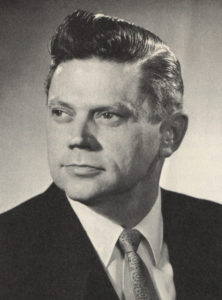Willie Rainach
Politician Willie Rainach was one of Louisiana's most vigorous opponents of desegregation.

Courtesy of Louisiana Research Collection at Tulane University Library
William Rainach. Unidentified
William “Willie” Rainach, a conservative Democratic state legislator from 1940 to 1960, was a longtime foe of Gov. Earl Long and became one of Louisiana’s most vigorous opponents of desegregation. He was born William Odom in Kentwood in Tangipahoa Parish in 1913. After the death of his mother during the 1917 influenza epidemic, his father placed him in the Baptist orphanage in Lake Charles. He was later adopted by Mr. and Mrs. Albert M. Rainach of Summerfield, near the Arkansas border in Claiborne Parish.
In 1924 Rainach was struck in the eye by a baseball; he would later lose sight in that eye because of the injury. He attended several colleges during the 1930s, including Southern State College in Magnolia, Arkansas; Strayer’s Business College in Washington, DC; and Louisiana State University. In 1939 Rainach founded the Claiborne Electric Cooperative, which brought power to Louisiana’s rural northwest. He also founded the Claiborne Butane Company in 1945 and became president of Arcadia Butane in 1967.
Rainach’s successful entrepreneurship in Claiborne Parish fueled a political career that got little attention outside his constituency until the civil rights battles of the 1950s. He was elected to the Louisiana House of Representatives in 1940 and went on to serve three terms in the state senate. Although he introduced the anti-union “right to work” legislation that became law in 1954, Rainach seized the public spotlight only after the US Supreme Court’s ruling that same year in Brown v. Board of Education. Within days of the court’s decision to strike down the “separate but equal” laws permitting segregation in public schools, the Louisiana legislature formed the Joint Legislative Committee to Maintain Segregation, under Rainach’s chairmanship. He was responsible for passing bills and an amendment to the state constitution that attempted to buttress school segregation “not on the basis of race but for the advancement, protection and better education of all children of school age in Louisiana regardless of race.”
When Earl Long, a moderate on race issues, was elected governor in 1956, state funding was cut for the Committee to Maintain Segregation. Undeterred, Rainach joined with Leander Perez, the political boss of Plaquemines Parish, to set up Citizens Councils, a network of organizations that battled the civil rights movement and denounced desegregation as a “communist conspiracy.” Rainach gained a measure of national attention for his stand, becoming chairman of the Citizens Council of America in 1958.
Rainach clashed openly with Long over Rainach’s attempt to prevent African Americans from voting in Louisiana, which had been among the more moderate southern states in its policy toward enfranchising blacks. Rainach was determined to purge the electoral rolls of all blacks, name by name if necessary, through a state law that allowed two registered voters to challenge the validity of any other voter—even for misspellings or minor mistakes on their voter registration forms. Rainach and his supporters also relied on an unenforced section of the Louisiana Constitution of 1921 (replaced in 1974), which required all registrants to fill out applications without assistance and to read and interpret a portion of the US Constitution selected by the registrar. Rainach said that some one hundred thousand black voters at the time were illegally registered because they could not interpret the Constitution. In a much-publicized incident, Rainach tried to disenfranchise Long’s maid, but he was thwarted when the governor ordered the parish registrar to reinstate her. From 1958 through 1959 Rainach succeeded in purging 15,326 black voters from the rolls, dealing a blow to Long’s chances for reelection by diminishing the solid bloc of support the governor had enjoyed among African Americans.
Rainach joined the 1959 gubernatorial election, a contest that was fought largely on the issue of race. During his run for governor, Rainach struck many voters as one dimensional in contrast to erstwhile New Orleans mayor DeLesseps “Chep” Morrison—who had cast himself as a segregationist to garner support—and less likable than the other leading contender, country singer and former governor Jimmie Davis. Rainach ran a weak third in the Democratic primary, winning 17 percent of the vote, and endorsed Davis in the runoff against Morrison. In the general election, Davis became governor in 1960 after a landslide victory over Republican nominee Francis Grevemberg.
Rainach’s political star dimmed in the aftermath. As a delegate to the 1960 Democratic National Convention that nominated John F. Kennedy for president, he complained that the Republican Party might be a better home for segregationists. Although he anticipated the historic shift in the South’s political affiliation, he never served in public office again. On January 26, 1978, Rainach’s shooting death was ruled a suicide by the coroner. He was survived by his wife, Mable Justin Fincher Rainach, and three children.
In a 1974 interview with the Shreveport Times, Rainach rejected the appellation “conservative,” though it had long been used by the media to describe his political philosophy. “In the days of Paine and Jefferson, the classical liberal stood for freedom of the individual as opposed to government control and the worth of the individual,” said Rainach in the interview. “I’m not anti-Negro, but I still feel the same way about it. I don’t hate Negroes—I didn’t hate them then—some of our most valued employees here at the [Arcadia Butane] company are Negroes, and I would never want to hurt them. But I do not feel the two societies should mix. I wish it were possible for whites and blacks to live together, but it just isn’t.”
